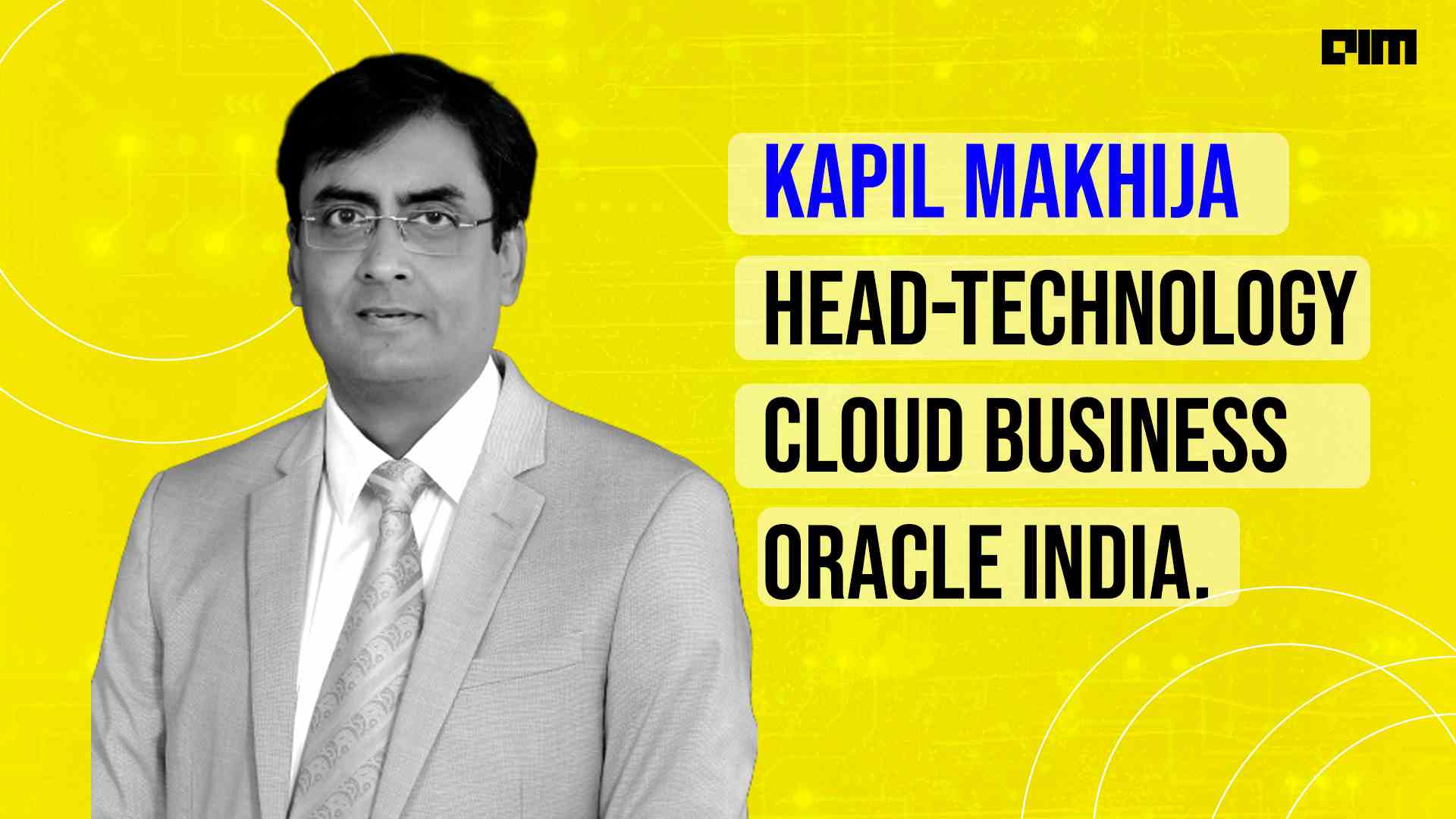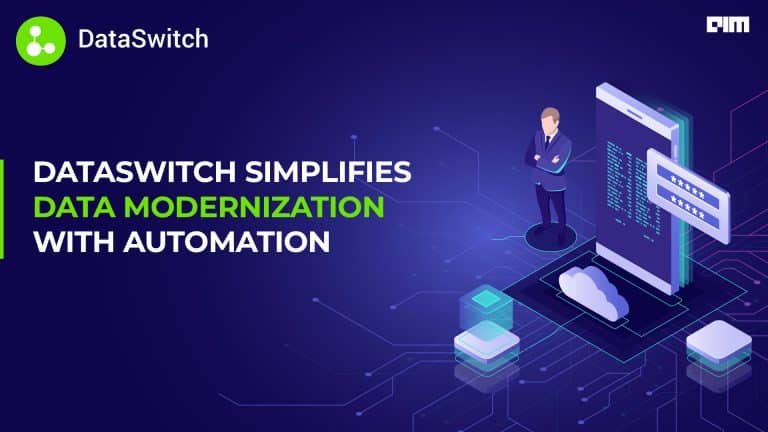With each passing year, it becomes clearer that there is a direct link between economic winners and organisations that excel at using data for innovation and efficiency. Data-driven organisations enable their employees at all levels to use the right data to make decision-making processes easier, giving them a competitive advantage.
To do this, many are looking towards the promise of the data mesh approach, which aims to release data from its current rigid, often quite disconnected and monolithic data stores into de-centralised data architecture, making it better, faster, cheaper to achieve business transformation objectives. Analytics India Magazine caught up with Kapil Makhija, Head-Technology Cloud, Oracle India, to understand more about data mesh and data for businesses in general.
AIM: What, according to you, is the most sought cloud model, especially by startups – public/private/hybrid, and why?
Kapil Makhija: Most born-digital startups are looking to embrace a multi-cloud model in 2022. However, to avoid complexity, they are turning to a few trusted enterprise-class cloud providers so that they gain the best of every cloud based on the expertise of each hyperscale cloud provider.
In India, a large number of startups are increasingly choosing our secure, second-generation cloud infrastructure for mission-critical applications and workloads to innovate faster, scale easier, improve agility and lower costs consistently.
AIM: Competition has increased manyfold in the cloud computing space. So what are Oracle’s plans to stay ahead in the race?
Kapil Makhija: Oracle Cloud Infrastructure (OCI) offers a comprehensive set of public cloud services that enable customers to build and run a wide range of modern applications in a high-performance environment with high availability and enterprise-class SLAs. OCI is the only cloud platform with self-service capabilities. More customers recognise our unrivalled breadth and depth of cloud and cloud-ready offerings, with generational innovations like the Oracle Autonomous Database. Additionally, the variety of deployment models we offer and the better price-performance ratio our customers get with OCI are also key differentiating factors.
Last but not least, the pace of our cloud region expansion, both in India as well as globally, is perhaps the fastest by any major cloud provider. India is one of our fastest-growing markets, and we are very bullish on our growth strategy for this market. For example, we recently expanded our cloud region in Mumbai (India West) with Airtel Nxtra.
AIM: With a consistently growing demand for cloud infrastructure, how well is Oracle placed to ensure data security and data protection?
Kapil Makhija: Oracle has a proven track record of securely managing the world’s mission-critical data for over four decades. Security is in our DNA. So we embed advanced security protocols in all our products and services by default. As a result, OCI is the most secure cloud platform available to organisations, helping them reduce risks from ongoing threats by utilising security-first design principles such as built-in tenant isolation and least privilege access and providing simple-to-implement security controls.
Furthermore, our generational innovation, the Oracle Autonomous Database, the world’s first self-securing, self-repairing, and self-driving database, enables organisations to bid goodbye to complex, routine database management tasks like database tuning and applying security updates and instead allows employees to focus on higher-value tasks that can unlock more value for their business.
AIM: Can you share your views regarding the trend of enterprises using a data mesh approach to better manage their data and extract more value for the business?
Kapil Makhija: Data is now an asset with explicit and implicit values. To capitalise on this value and maximise its potential, a data mesh will strive to make data as liquid as possible, allowing data events to be detected, replicated, transformed, and analysed across multiple clouds and over long distances.
The data mesh is generating so much interest because it makes data easily accessible across modern multi-cloud IT architectures. What has brought the data mesh concept to the fore is the need for a change in thinking on how companies manage data and make it more easily available because right now, many can’t. The traditional and more monolithic ways of doing data integration or using isolated data lakes are insufficient to meet the needs of organisations today. There is a broad recognition across the industry that data needs to become less centralised and more real-time.
Essentially, Oracle’s vision of a data mesh is an open, enterprise-grade solution for all data types. Most importantly, that can be fully trusted for an organisation’s most valuable data. There are a number of Oracle products, tools, and cloud services that help customers with a data mesh. When we consider the broad definition of the data mesh to include ‘data products’, it is easy to see how important it is to include Oracle capabilities such as the converged database (e.g., Oracle Autonomous Database), low-code application development (Oracle Apex), and self-service analytics (Oracle Analytics Cloud) into the discussion.
And intrinsically, the product and cloud service that brings the data mesh approach is Oracle GoldenGate. This is a highly trusted data integration solution used by thousands of customers worldwide, including 84 per cent of Fortune Global 100 companies. It is also now available as a highly automated, fully-managed cloud service that provides customers with a real-time data fabric platform helping them ensure that their valuable data is always available anywhere they need it and analysable in real-time.
AIM: What do you think are some of the challenges when it comes to the cloud infrastructure landscape in India? How does Oracle tackle these challenges?
Kapil Makhija: The pandemic compelled organisations to put their cloud plans into top gear. Some of the challenges customers cite with first-generation clouds is the flexibility of deployment models, ease of migration, security, regulatory/compliance and interoperability issues. These are some of the reasons why more and more Indian organisations are moving away from traditional cloud providers and turning to our next-generation cloud infrastructure.
OCI provides tools and architecture to assist enterprises in migrating from on-premises to cloud environments, leveraging improved automation and built-in security to mitigate threats, ultimately empowering organisations to realise superior cloud economics. In addition, we have designed programs to collaborate closely with customers so that they can extract the maximum business value from their cloud usage and improve business resilience and efficiencies.
AIM: What recent changes and updates have been introduced to make your cloud infrastructure more attractive and easier for customers to move to?
Kapil Makhija: Oracle has come up with various programs like Oracle Universal Credits (UC) under which customers who use sign a single contract, pay in advance, and can use any Oracle PaaS/IaaS they want for as long as the credits last (after which they can buy more credits). Then we have Oracle Bring Your Own License (BYOL). Customers who use this can apply licenses they already own for on-premises Oracle software to equivalent, highly automated Oracle PaaS/IaaS services. As a result, customers can use their existing on-premises Oracle licenses with full workload compatibility and license mobility, allowing them to extract business value faster.
We have recently come up with two more programs for our OCI customers. One is Oracle Cloud Lift Services: with this, customers receive advice from Oracle’s expert cloud engineers on successfully planning, architecting, prototyping, and managing cloud migrations on time and within budget. As a result, customers can move critical workloads in weeks rather than months. The other one is the Oracle Support Rewards program. Under this, we help customers accelerate cloud migrations while lowering software license support costs by earning rewards on every dollar they spend on OCI.
We recognise our responsibility as a cloud major towards helping build a futuristic cloud ecosystem in India. Further, to help customers be fully prepared for a cloud-first world, our partners need to be equipped with the right skills and expertise as well. Therefore, we are offering free certification via Oracle University until the end of February 2022. We believe this will encourage more and more technology professionals to gain much-needed cloud expertise and thereby benefit from our expert-created training and globally recognised certification program.



















































































